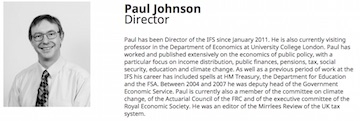Pensioners have higher incomes on average than the rest of the population for the first time, the Institute for Fiscal Studies has reported.
The current generation of pensioners is better off than ever before, the organisation said.
IFS director Paul Johnson said, however, as he set out the research that the triple lock policy, whereby the pension rises by the higher of inflation as measured by CPI, earnings growth, and 2.5%, “needs to end”.
Speaking at the inaugural Pensions Management Institute annual lecture this week, Mr Johnson set out how modelling by its researchers suggested that pensioners’ incomes will continue to rise for at least the next decade.
The IFS report showed:
• Pensioners now have higher incomes on average than the rest of the population, once housing costs and family composition are taken into account.
• Pensioners’ incomes have continued to rise post-recession as the incomes of working-age households have fallen
• Just 30 years ago pensioners were at least three times as likely to be poor as non-pensioners. They are now less likely to be poor.
• A large proportion of those retiring now will actually be better off in retirement than they were on average during their working life.
• Younger generations are also likely bearing some of the cost of ‘generous’ occupational pension schemes from which they themselves will never benefit.
On the triple lock he said: “At some point it will prove to be prohibitively expensive; the OBR estimates that it will add well over one per cent of national income to pension spending by the middle of this century relative to the cost of earnings indexation.
“It also adds a bizarre degree of randomness into the future level of state pensions which will depend not on overall increases in prices or earnings but on the timing of those rises.”
{desktop}{/desktop}{mobile}{/mobile}
Mr Johnson said: “We have achieved an astonishing turnaround in the incomes of pensioners over the last three decades, without increasing public spending to levels seen in many other continental European countries.
“But the longer term future looks very uncertain. Those now in their 20s, 30s and 40s may well end up with lower incomes in retirement than their parents. The focus for policy needs to be on getting private provision right, with more risk sharing, and a rational and stable tax policy.”
Retirees' incomes higher than rest of society for first time

